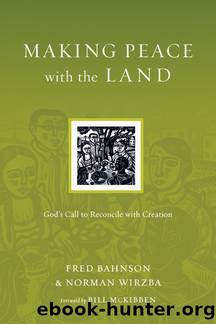Making Peace with the Land by Bahnson Fred;Wirzba Norman;McKibben Bill;

Author:Bahnson, Fred;Wirzba, Norman;McKibben, Bill; [Bahnson, Fred]
Language: eng
Format: epub
Publisher: InterVarsity Press
Published: 2012-07-03T00:00:00+00:00
5
Reconciliation Through Eating
Norman Wirzba
In what are surely some of the most succinct expressions of Godâs transforming presence, the Gospels tell us that Jesus was known (and despised by religious leaders) as the fellow who âwelcomes sinners and eats with themâ (Lk 15:2). Although John the Baptist ate no bread and drank no wine, Jesus was the Son of Man who came eating and drinking, prompting people to say, âLook, a glutton and a drunkard, a friend of tax collectors and sinners!â (Lk 7:34; Mt 11:19). The kingdom of God is a place where people come from the east and the west, from the north and the south, and eat (see Lk 13:29). In the New Jerusalem, the place where we will live eternally with the God who has chosen to dwell with us, people from all the nations will gather around the tree of life to be healed and fed by its fruit (see Rev 22:1-2).
That eating mattered to Jesus should not surprise us if we understand that eating is the daily enactment of our dependence on other people, the land and ultimately God. Every time we take a bite, we bear witness to a bewildering array of relationships that connect us to earthworms, raspberry shoots, water, sunshine, farmers, cooks and friends. When we eat well, these relationships are honored and nurtured. When we eat poorly, we demean and degrade the sources of nourishment that make living a possible feast. Jesus cares about eating because it is in the growing, preparing and sharing of food that we bear witness to Godâs desire that all creatures taste life fully.
It is easy for many people, especially when walking through a well-stocked grocery store with its attractive displays, to take eating for granted and to assume that food is of little significance for Christian faith and life. We might recall Matthewâs Gospel, in which Jesus says, â[D]o not worry about your life, what you will eat or what you will drink, or about your body, what you will wear. Is not life more than food, and the body more than clothing?â (Mt 6:25). God knows that we need to eat. Our task is not to worry but to trust that God will provide.
Although we should certainly care about the fact that well over a billion people still do not have enough to eat, it is tempting to assume that this distinctly Christian concern about eating ends when food has been adequately distributed and shared. This is a serious mistake. Jesusâ admonition is directed to the ways in which worry dominates and distorts our relationships with the world and each other. Clearly life is more than food. We can, if we are not careful, turn eating into an idolatrous affair by making food our obsessive focus. But there is no life without food. God created a world in which every creature lives by eating. God daily sustains creatures by providing them with gifts of decomposition, photosynthesis and digestion, which are essential for the eating we enjoy.
Download
This site does not store any files on its server. We only index and link to content provided by other sites. Please contact the content providers to delete copyright contents if any and email us, we'll remove relevant links or contents immediately.
The 5 Love Languages: The Secret to Love That Lasts by Gary Chapman(9290)
The Space Between by Michelle L. Teichman(6578)
Assassin’s Fate by Robin Hobb(5856)
Wiseguy by Nicholas Pileggi(5322)
Everything Happens for a Reason by Kate Bowler(4479)
Gerald's Game by Stephen King(4377)
Pillow Thoughts by Courtney Peppernell(4019)
A Simplified Life by Emily Ley(3971)
The Power of Positive Thinking by Norman Vincent Peale(3865)
Resisting Happiness by Matthew Kelly(3197)
Girl, Wash Your Face by Rachel Hollis(3126)
Harry Potter and the Prisoner of Azkaban (Book 3) by J. K. Rowling(3114)
Being Aware of Being Aware by Rupert Spira(3086)
Real Sex by Lauren F. Winner(2868)
The Code Book by Simon Singh(2862)
More Language of Letting Go: 366 New Daily Meditations by Melody Beattie(2851)
Name Book, The: Over 10,000 Names--Their Meanings, Origins, and Spiritual Significance by Astoria Dorothy(2841)
The Holy Spirit by Billy Graham(2777)
The Secret Power of Speaking God's Word by Joyce Meyer(2755)
